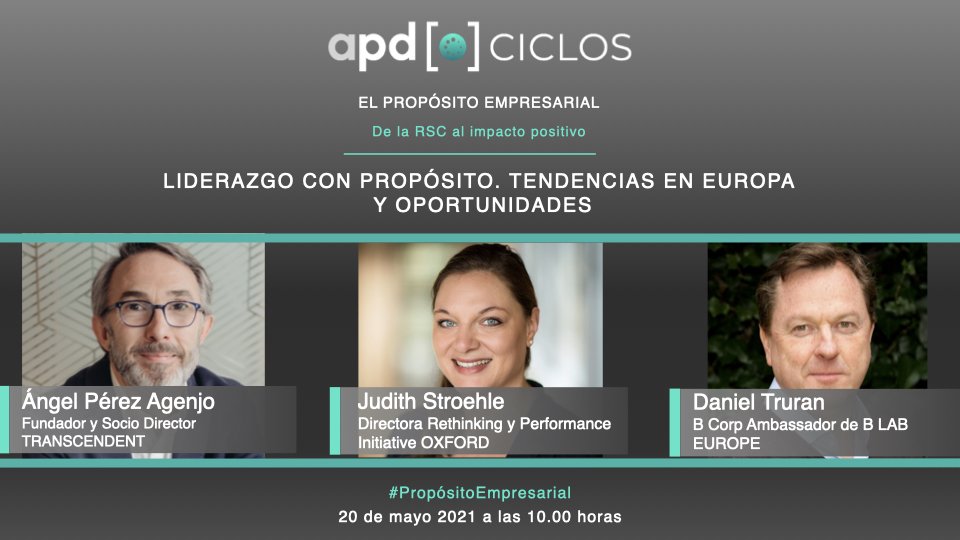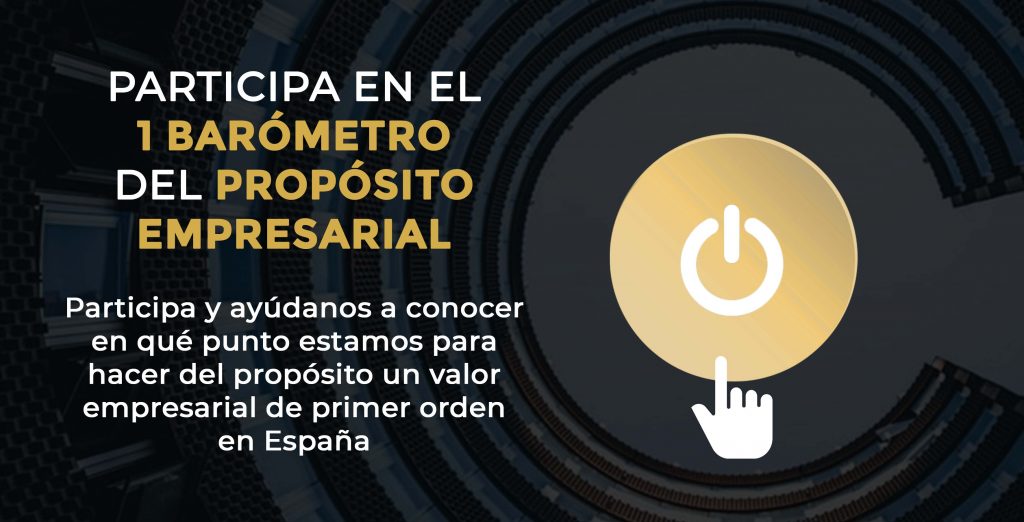The purpose is a strategic lever The value creation potential and profitability is well established. Companies with a defined and integrated purpose, whose approach is to focus on improving their financial performance and the common good, achieve a better performancea highest market valuation and create more shareholder value compared to the rest.
This need to incorporate ESG (social, environmental and governance) aspects is a trend that has no way back and will force companies to transform themselves by making impact a management tool.
"Purpose increasingly demands the professionalisation of business leaders".
A new committed leadership
The activation of purpose and the management of social, environmental and governance impacts is becoming an element that demands a further professionalisation to business leaders.
To address this issue, José Antonio LabarraCEO of ROADISa leading company in the development, operation and management of transport infrastructure assets, recently met with Ángel Pérez AgenjoTranscendent's managing partner, at a meeting organised by APD on the Business Purpose.
The five benefits of purpose in business
There are a number of competitive advantages that differentiate a company that works and activates the Purpose from others. These include:
- Increases profitability and market value. Purposeful companies improve their market value faster than others. However, purpose has a positive impact that goes far beyond a company's bottom line as it generates many other benefits as well.
- Improves reputation and legitimacy to operate: By publicly stating its purpose, a company demonstrates its commitment and the benefits it brings to its stakeholders and society as a whole, and this clearly enhances its reputation. Companies that define and activate their purpose therefore significantly reduce the risk of corporate scandal eroding their licence to operate.
- It allows you to manage and retain talent: Business purpose is a differentiating element that can be beneficial for all three aspects since, from a Human Resources management point of view, it constitutes a real strategy for the management of human resources. employer branding.
- Customer loyalty: It emphasises the unique and distinctive contribution that the company makes to the big issues we face. For that reason, it has the potential to generate stronger relationships with its customers, who tend to be more attracted to companies that convey authenticity and that they consider to be worthy of their trust. when a company sets and activates its Purpose it arouses interest and attraction from its customers.
- Investor interest is increasing: Investors are increasingly integrating ESG criteria into their decisions and are interested in the social and environmental performance of companies.
In the case of ROADIS, its Purpose is in the value creation in the communities in which it operates through profitable investments in major infrastructure projects. To do this, it relies on 4 main attributes: ethics, prosperity, innovation and security".
The transformation process towards sustainability
In 2019, the company headed by Labarra decided to take a step forward and adopt the sustainability as part of its business model and, above all, as a lever for value creation in order to become an active part of the transition towards a more responsible and sustainable economic model.
According to its CEO "we defined a Cross-cutting Master Sustainability Plan to all areas of the company by offering a framework for action that would allow us to have a solid position in the business context, as well as to become an active part of the transition to a more responsible and sustainable economic model".
For his part, Pérez Agenjo emphasises that "the market rewards the purpose-driven companies and punishes those that do not. That is already part of the new business paradigm. And therefore, for the 43% of the companies sustainability policies and management of ESG parameters have become a urgent issue".
Measuring impact, a key tool to avoid the "Impactwashing
Pérez Agenjo assures that establish an impact measurement system In the company, setting indicators and putting them at the heart of corporate strategy is one of the first steps to combat the already well-known Impactwashing.
For the CEO of ROADIS quantifying and measuring impacts is essential to understand and analyse the impact generated on both society and the environment. Quantification is not easy, but it is necessary because what cannot be measured cannot be improved.
"Quantifying and measuring impacts is essential to understand and analyse the impact generated".
To this end, they have set up a system to measure the company's impact, and they have set indicators with the aim of putting them at the heart of corporate strategy.
"At ROADIS we have developed a methodology for measuring economic, social and environmental impact of our assets in order to identify the medium and long-term effects of our assets on users, employees, communities, the environment, suppliers, institutions and any other relevant stakeholders in the environments in which we operate. It is a valuable tool we use to identify and quantify impacts from a broader perspective. A methodology based on the best practices of the Impact Management Project (IMP)," Labarra concludes.




